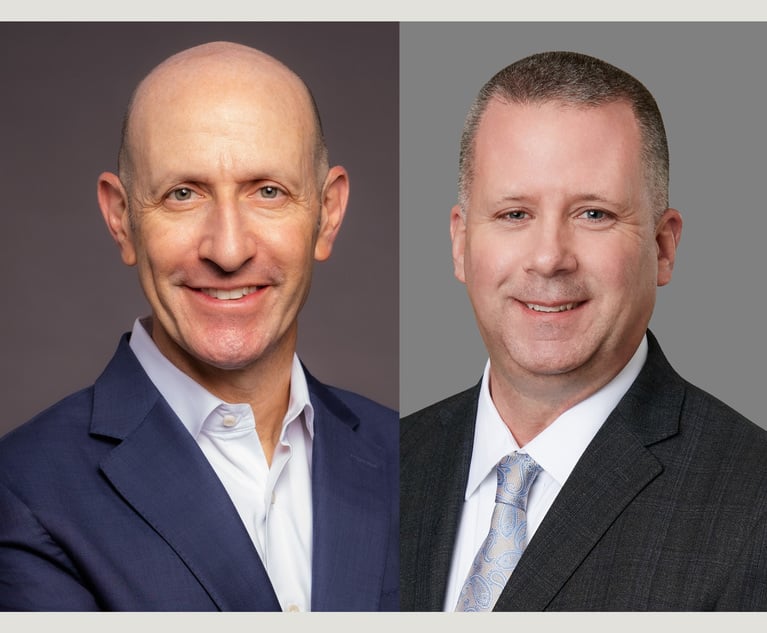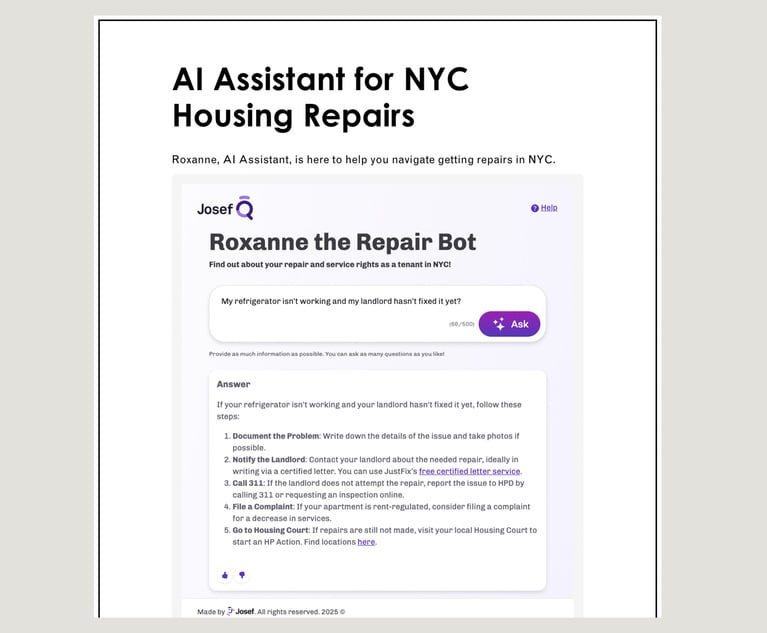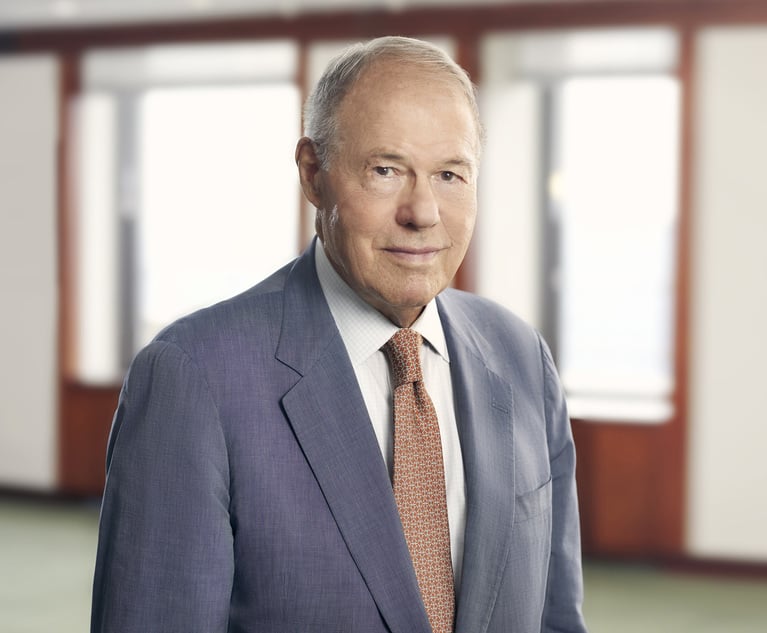Taxi Medallion Owners Say Unequal Treatment Is Boosting Uber, Lyft
New York City taxicab medallion holders are being unfairly forced to comply with regulations not imposed upon ride-sharing companies like Uber and Lyft and that those constraints are causing them to lose business, a lawyer representing New York credit unions argued Tuesday before an appeals court.
October 24, 2017 at 04:49 PM
8 minute read
 The New York City Taxi & Limousine Commission chose the Nissan NV200 as the “Taxi of Tomorrow.”
The New York City Taxi & Limousine Commission chose the Nissan NV200 as the “Taxi of Tomorrow.”
New York City taxicab medallion holders are being unfairly forced to comply with regulations not imposed upon ride-sharing companies like Uber and Lyft and that those constraints are causing them to lose business, a lawyer representing New York credit unions argued Tuesday before an appeals court.
The group of plaintiffs, which also include taxicab medallion holders, are challenging a district judge's March ruling that the medallion holders are not subject to disparate treatment because hailing a cab in the street is different from summoning a car through a computer application.
In the ruling, U.S. District Judge Alison Nathan of the Southern District of New York said that taxis effectively, have a “collective, government-sanctioned monopoly over one particular form of hailing” and that courts around the country have found that monopoly justifies subjecting the industry to a different set of regulations than ride-sharing services.
The city's Taxi & Limousine Commission gives cabs the exclusive right to accept passengers by street hails while ride-sharing companies are considered for-hire vehicles that take passengers only by prearrangement.
Cabs are also required to comply with a raft of regulations promulgated by the commission that ride-sharing companies are not, such as setting fare rates and maintaining specific vehicle attributes.
In 2016, Manhattan Supreme Court Justice Manuel Mendez denied the medallion owners' requests for declaratory and injunctive relief and ruled to dismiss their suit, and a panel of the Appellate Division, First Department, affirmed the decision by Mendez.
Among the regulations with which medallion owners have taken issue is a new rule requiring half of all New York City cabs to be wheelchair accessible by 2020.
The credit unions that are parties to the federal case—Melrose Credit Union, Progressive Credit Union and LOMTO Federal Credit Union, which are all located in New York—say that the regulations have driven up costs while ride-sharing services have been free to construct a “parallel taxi network” that is siphoning off passengers and drivers from the city's cabs.
The credit unions said that the growth in competition has caused them to lose profits.
Arguing before a panel of the U.S. Court of Appeals for the Second Circuit, Todd Higgins, managing partner at Crosby & Higgins, said that a would-be passenger using their smartphone to hail an Uber is effectively the same as hailing a yellow cab.
“The questions of the disparate treatment have been catastrophic,'” Higgins said.
Higgins told the panel that the value of a medallion has plummeted from more than $1 million just a few years ago to about $130,000 today.
But Judges Dennis Jacobs, Barrington Parker and Robert Sack of the U.S. Court of Appeals for the Second Circuit pushed Higgins to define what counts as a hail or a prearrangement, including if one were to call a taxi dispatcher and request a pick up by taxi.
Higgins said that, while it is not defined in statute, the difference between prearranging a ride and hailing a car has traditionally been the “concept of time.”
But Assistant Corporation Counsel MacKenzie Fillow of the city's Law Department said the distinction between street hails and prearrangement is not based on time, but whether or not consumers are able to choose their ride service.
“The speed with which the car comes cannot be the determining factor of whether something is a street hail or a prearrangement,” Fillow said. “The idea is whether the customer has a choice.”
@|Andrew Denney can be reached at [email protected]. Twitter: @messagetime
 The
The
The group of plaintiffs, which also include taxicab medallion holders, are challenging a district judge's March ruling that the medallion holders are not subject to disparate treatment because hailing a cab in the street is different from summoning a car through a computer application.
In the ruling, U.S. District Judge Alison Nathan of the Southern District of
The city's Taxi & Limousine Commission gives cabs the exclusive right to accept passengers by street hails while ride-sharing companies are considered for-hire vehicles that take passengers only by prearrangement.
Cabs are also required to comply with a raft of regulations promulgated by the commission that ride-sharing companies are not, such as setting fare rates and maintaining specific vehicle attributes.
In 2016, Manhattan Supreme Court Justice Manuel Mendez denied the medallion owners' requests for declaratory and injunctive relief and ruled to dismiss their suit, and a panel of the Appellate Division, First Department, affirmed the decision by Mendez.
Among the regulations with which medallion owners have taken issue is a new rule requiring half of all
The credit unions that are parties to the federal case—Melrose Credit Union, Progressive Credit Union and LOMTO Federal Credit Union, which are all located in
The credit unions said that the growth in competition has caused them to lose profits.
Arguing before a panel of the U.S. Court of Appeals for the Second Circuit, Todd Higgins, managing partner at Crosby & Higgins, said that a would-be passenger using their smartphone to hail an Uber is effectively the same as hailing a yellow cab.
“The questions of the disparate treatment have been catastrophic,'” Higgins said.
Higgins told the panel that the value of a medallion has plummeted from more than $1 million just a few years ago to about $130,000 today.
But Judges Dennis Jacobs, Barrington Parker and Robert Sack of the U.S. Court of Appeals for the Second Circuit pushed Higgins to define what counts as a hail or a prearrangement, including if one were to call a taxi dispatcher and request a pick up by taxi.
Higgins said that, while it is not defined in statute, the difference between prearranging a ride and hailing a car has traditionally been the “concept of time.”
But Assistant Corporation Counsel MacKenzie Fillow of the city's Law Department said the distinction between street hails and prearrangement is not based on time, but whether or not consumers are able to choose their ride service.
“The speed with which the car comes cannot be the determining factor of whether something is a street hail or a prearrangement,” Fillow said. “The idea is whether the customer has a choice.”
@|Andrew Denney can be reached at [email protected]. Twitter: @messagetime
This content has been archived. It is available through our partners, LexisNexis® and Bloomberg Law.
To view this content, please continue to their sites.
Not a Lexis Subscriber?
Subscribe Now
Not a Bloomberg Law Subscriber?
Subscribe Now
NOT FOR REPRINT
© 2025 ALM Global, LLC, All Rights Reserved. Request academic re-use from www.copyright.com. All other uses, submit a request to [email protected]. For more information visit Asset & Logo Licensing.
You Might Like
View All
Meet the Long Island Judge Tapped to Be US Attorney for Eastern District of New York
2 minute read
New York’s Property Tax Incentives and Abatements Make Development Feasible
7 minute read
Josef Partners With NYU, Housing Court Answers to Launch AI Assistant Built for Tenants

Trending Stories
Who Got The Work
Michael G. Bongiorno, Andrew Scott Dulberg and Elizabeth E. Driscoll from Wilmer Cutler Pickering Hale and Dorr have stepped in to represent Symbotic Inc., an A.I.-enabled technology platform that focuses on increasing supply chain efficiency, and other defendants in a pending shareholder derivative lawsuit. The case, filed Oct. 2 in Massachusetts District Court by the Brown Law Firm on behalf of Stephen Austen, accuses certain officers and directors of misleading investors in regard to Symbotic's potential for margin growth by failing to disclose that the company was not equipped to timely deploy its systems or manage expenses through project delays. The case, assigned to U.S. District Judge Nathaniel M. Gorton, is 1:24-cv-12522, Austen v. Cohen et al.
Who Got The Work
Edmund Polubinski and Marie Killmond of Davis Polk & Wardwell have entered appearances for data platform software development company MongoDB and other defendants in a pending shareholder derivative lawsuit. The action, filed Oct. 7 in New York Southern District Court by the Brown Law Firm, accuses the company's directors and/or officers of falsely expressing confidence in the company’s restructuring of its sales incentive plan and downplaying the severity of decreases in its upfront commitments. The case is 1:24-cv-07594, Roy v. Ittycheria et al.
Who Got The Work
Amy O. Bruchs and Kurt F. Ellison of Michael Best & Friedrich have entered appearances for Epic Systems Corp. in a pending employment discrimination lawsuit. The suit was filed Sept. 7 in Wisconsin Western District Court by Levine Eisberner LLC and Siri & Glimstad on behalf of a project manager who claims that he was wrongfully terminated after applying for a religious exemption to the defendant's COVID-19 vaccine mandate. The case, assigned to U.S. Magistrate Judge Anita Marie Boor, is 3:24-cv-00630, Secker, Nathan v. Epic Systems Corporation.
Who Got The Work
David X. Sullivan, Thomas J. Finn and Gregory A. Hall from McCarter & English have entered appearances for Sunrun Installation Services in a pending civil rights lawsuit. The complaint was filed Sept. 4 in Connecticut District Court by attorney Robert M. Berke on behalf of former employee George Edward Steins, who was arrested and charged with employing an unregistered home improvement salesperson. The complaint alleges that had Sunrun informed the Connecticut Department of Consumer Protection that the plaintiff's employment had ended in 2017 and that he no longer held Sunrun's home improvement contractor license, he would not have been hit with charges, which were dismissed in May 2024. The case, assigned to U.S. District Judge Jeffrey A. Meyer, is 3:24-cv-01423, Steins v. Sunrun, Inc. et al.
Who Got The Work
Greenberg Traurig shareholder Joshua L. Raskin has entered an appearance for boohoo.com UK Ltd. in a pending patent infringement lawsuit. The suit, filed Sept. 3 in Texas Eastern District Court by Rozier Hardt McDonough on behalf of Alto Dynamics, asserts five patents related to an online shopping platform. The case, assigned to U.S. District Judge Rodney Gilstrap, is 2:24-cv-00719, Alto Dynamics, LLC v. boohoo.com UK Limited.
Featured Firms
Law Offices of Gary Martin Hays & Associates, P.C.
(470) 294-1674
Law Offices of Mark E. Salomone
(857) 444-6468
Smith & Hassler
(713) 739-1250






